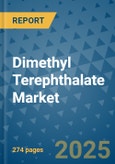Market Insights
Dimethyl Terephthalate plays a critical role as a feedstock in the manufacturing of Polyethylene Terephthalate (PET) and Polybutylene Terephthalate (PBT) - two essential polymers with widespread applications in industries such as food and beverage packaging, electronics, and automotive. As global demand for recyclable, durable, and lightweight packaging materials intensifies, DMT continues to gain importance for producers seeking cost-effective and sustainable polymer solutions.Over the historical period from 2018 to 2022, the DMT market witnessed consistent growth driven by surging global PET and PBT consumption. As manufacturers intensify focus on sustainability and recyclability, the demand for DMT - particularly in advanced chemical recycling methods - is expected to rise further.
Market Drivers
One of the primary drivers of the DMT market is the surging demand for Polyethylene Terephthalate (PET), widely used for packaging carbonated beverages, bottled water, and various consumer goods. As the food and beverage industry continues to adopt lightweight and shatter-resistant packaging solutions, the need for PET - and thus for DMT - has escalated.Additionally, Polybutylene Terephthalate (PBT), another derivative of DMT, is seeing growing usage in the consumer electronics and automotive sectors. PBT is known for its excellent electrical insulation properties, which make it ideal for wiring systems, electrical connectors, and other electronic components. As the world transitions towards electric vehicles and smarter electronics, this demand is likely to see significant escalation.
Environmental concerns and increasing focus on recycled polyester production are further boosting the DMT market. DMT is used in chemical recycling technologies that break down used polyester products into their base monomers, enabling the production of high-quality recycled polyester with minimal degradation.
Business Opportunity
With technological advancements in polymer recycling processes, companies are leveraging DMT-based methods to reduce environmental impact and meet circular economy goals. The increasing shift towards closed-loop recycling systems in both Europe and Asia is opening up lucrative growth avenues.Moreover, investments in new production facilities, particularly in countries like Turkey and China, are expected to enhance manufacturing capacities and support domestic consumption. The rising demand for polyester fibers in textiles and automotive interiors also serves as a promising area for market expansion.
Regional Analysis
Asia Pacific continues to dominate the global DMT market due to the presence of major manufacturers, extensive infrastructure, and growing consumption in packaging and electronics. The region houses some of the key producers of DMT including Teijin Ltd., China Petroleum and Chemical Co., and SK Innovations. Significant capacity expansions and new technologies being deployed in countries like China, Japan, and South Korea have fortified the region’s position.China, as one of the largest producers and consumers of DMT, is witnessing increasing application in textile manufacturing, especially in polyester fibers used across the apparel and industrial fabric sectors. The rapid urbanization, industrial output growth, and rising consumer base further stimulate demand.
Japan holds a substantial share of the DMT market in the Asia Pacific region. Innovations in chemical recycling of polyester fibers using DMT, as introduced by companies like Teijin Ltd., are fostering growth. Japan's approach to high-quality recycling and minimizing environmental impact positions it as a critical contributor to the global market.
South Korea is gaining prominence due to its rapidly growing consumer electronics sector, which extensively utilizes PBT. The country’s electronics market, led by telephony and smart appliances, is directly boosting demand for PBT and consequently DMT.
In Turkey, SASA's strategic investment in new polyester production capacity is expected to drive higher domestic demand for DMT. This move not only meets local consumption but also boosts the export capacity of polyester-based products.
The United States, being the sole producer of DMT in North America, continues to be a stable and significant player in the global market. Eastman Chemical’s ongoing initiatives, including investments in plastic recycling plants and PRT (Polyester Renewal Technology), reinforce the region’s focus on sustainable production practices and recycling infrastructure.
Key Players
Several industry leaders are shaping the global DMT Analysis through innovation, capacity expansion, and strategic collaborations. Key players include:
- Teijin Ltd.
- Eastman Chemical Company
- SK Petrochemicals Co., Ltd.
- TCI Chemicals
- Merck KGaA
- A.B Enterprises
- SASA Polyesters Sanayi AS
- Fiber Intermediate Products Co.
- JSC Mogilevkhimvolokno
- Sarna Chemicals Pvt. Ltd.
- Oxxynova
- Petrobrazi
- Petrocel SA
- Yambolen AD
Recent Developments
- Itochu, Teijin, and JGC entered into a collaboration in December 2022 to license DMT-based chemical recycling technology that removes dyes and impurities, producing high-quality recycled polyester.
- In November 2022, Eastman Chemical announced major investments in recycling infrastructure utilizing polyester renewal technology, aiming to break down PET into DMT and ethylene glycol for reuse.
- SASA, the Turkish polyester major, invested approximately US$ 300 million in a new PET production facility in Adana, significantly increasing raw material demand for DMT.
Segmentation of the Global Dimethyl Terephthalate Market
By Form
- Flake DMT
- Liquid DMT
- Oval DMT
By Application
- Polyethylene Terephthalate (PET)
- Polybutylene Terephthalate (PBT)
By End User Industry
- Food & Beverages
- Healthcare
- Consumer Electronics
- Packaging
- Others
By Region
- North America
- Latin America
- Europe
- Asia Pacific
- Middle East and Africa
This product will be delivered within 1-3 business days.
Table of Contents
Companies Mentioned
- A.B. Enterprises
- Eastman Chemical Company
- Fiber Intermediate Products Co.
- JSC Mogilevkhimvolokno
- Merck KGaA
- Sarna Chemicals Pvt. Ltd.
- SASA
- SK Petrochemical Co., Ltd
- TCI Chemicals
- Teijin Ltd








